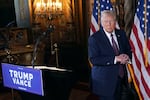
President-elect Donald Trump walks from the podium after a news conference at Mar-a-Lago, Tuesday, Jan. 7, 2024, in Palm Beach, Fla.
Evan Vucci
PALM BEACH, Fla./WASHINGTON — President-elect Donald Trump on Tuesday repeated his threat that “all hell will break out” if Hamas does not agree to release hostages it has held in Gaza by the time he returns to the White House on Jan. 20.
The comments came during a press conference at Mar-a-Lago where Trump aired a long list of complaints about a wide range of issues, ranging from President Biden’s new ban on offshore drilling, to his various legal cases, to the Panama Canal.
Negotiations between Hamas and Israel are ongoing in Qatar, with Hamas this week naming 34 hostages in Gaza — including two dual U.S. citizens — it would be willing to release in a ceasefire deal.
Steve Witcoff, Trump’s envoy to the Middle East, joined Trump briefly and told reporters that “we’re making a lot of progress” in trying to free hostages held by Hamas, and that he was “really hopeful that by the inaugural we’ll have some good things to announce.”
Trump would not elaborate on what he meant by his threat — first announced on social media in early December — that “all hell will break out” if a deal is not made.
“It will not be good for Hamas, and it will not be good, frankly, for anyone,” Trump said.
Trump downplayed the Jan. 6, 2021 riots at the Capitol
During the press conference, Trump reiterated that he plans to make “major pardons” to defendants charged in the Jan. 6, 2021 attack on the Capitol, something he previously has said he plans to do on his first day in office. He did not rule out pardons for those charged with violent offenses, saying he’ll “be looking at the whole thing.”
Trump also downplayed that there was an attempted insurrection that day, and falsely claimed that rioters did not have guns. Several were armed with loaded handguns.
He said his administration would look into the role of Lebanese militant group Hezbollah in Jan. 6, though there is no evidence of any involvement by that group.
Trump says Greenland and the Panama Canal are critical to U.S. security
Taking questions from reporters, Trump declined to rule out using military or economic coercion to gain control of the Panama Canal and Greenland, arguing both are needed for national and economic security.
Trump talked about buying Greenland during his first term. His new comments came as his son Donald Trump Jr. made a personal trip to Greenland. Trump wrote on social media Monday that “Greenland is an incredible place, and the people will benefit tremendously if, and when, it becomes part of our nation.”
In response, Mette Frederiksen — the prime minister of Denmark, which controls the Arctic island — emphasized that Greenland is not for sale in a television interview Tuesday.
Trump did not go into detail about why he wants to take over Greenland. Brown University professor Amanda Lynch told NPR last week the island is rich in resources and has a strategic location.
“Greenland is our eyes on everything that’s going on, including on the Northern Sea Route, which is controlled by Russia,” Lynch said. “In addition, Greenland has many resources — not just hydrocarbons, but also rare earth minerals and uranium. And when we’re thinking about the green energy transition, access to rare earth minerals in particular is important for any nation.”
Trump also repeated his recent social media assertions that Canada should join the United States. He ruled out the use of any military force to make that happen.
“You get rid of that artificially drawn line, and you take a look at what that looks like, and it would also be much better for national security,” Trump said Tuesday. He also complained about the U.S. trade deficit with Canada.
“We don’t need their cars. You know, they make 20% of our cars. We don’t need that. I’d rather make them in Detroit. We don’t need the cars. We don’t need their lumber. We have massive fields of lumber.”
NPR investigative correspondent Tom Dreisbach contributed to this report.